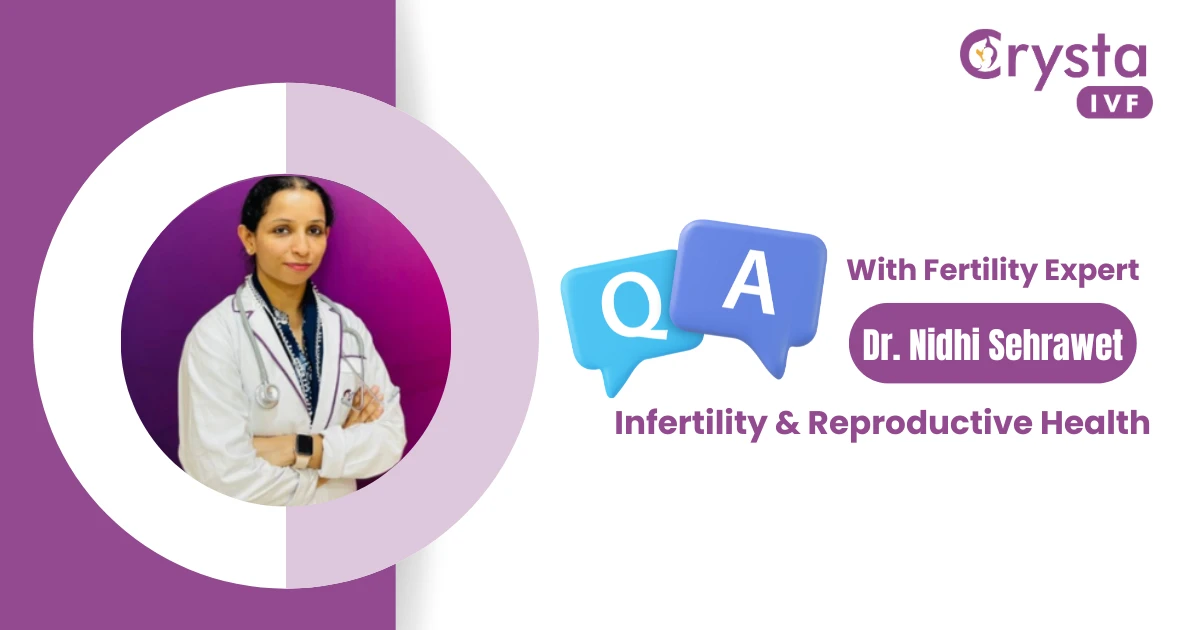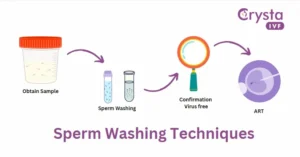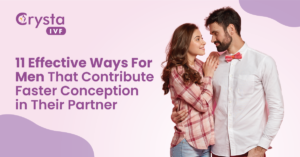Reproductive health and infertility is a topic often shrouded in stigma and taboo, but it’s important to open up the conversation and get informed about these issues.
Healthy fertility is a crucial aspect of overall health and well-being, and it’s essential to take care of ourselves in these areas just as we do with any other aspect of our health.
Plus, infertility and other reproductive health issues can be overwhelming and confusing, so it’s essential to have resources and expert advice. Hence, you make an informed decision for your reproductive health.
As a leading fertility expert at the best IVF center in Delhi NCR, Dr. Nidhi Sehrawet is often asked questions about female infertility and reproductive health. In this Q&A session, she shares her insights and expertise on a range of topics, including the prevailing stigmas around fertility health, treatment options, the future of infertility treatment and the various other aspects of reproductive health.
She also provides tips on how to take care of your reproductive health and what to consider when seeking fertility treatment. Dr. Nidhi Sehrawe’s extensive knowledge and compassionate approach make her a valuable resource for anyone seeking information and guidance on these important topics.
Q & A With Fertility Expert Dr. Nidhi Sehrawet
Q. Why is it important to talk about reproductive health in this fast-moving world?
Ans: As a medical professional and counsellor, it is my belief that fertility health should be openly discussed in order to promote informed decision-making and overall health and well-being. Reproductive health is a crucial aspect of an individual’s overall health, and by encouraging open discussion, we can identify and address potential issues that may arise.
Q. Why do people still hesitate to talk about reproductive health?
Ans: Well, I would say there isn’t any one specific reason; in fact, there are many. Some people may feel embarrassed or uncomfortable discussing these topics, while others may be unaware of the importance of reproductive health or how to access information and resources.
There may also be cultural or societal barriers that prevent people from discussing reproductive health openly. The mission to make people aware might be tough, but we are determined to do that.

Q. How can we create a more open and accepting culture around reproductive health?
Ans: One way to create a more open and accepting culture around reproductive health is by educating people about the importance of these issues and providing accessible information and resources.
This will also help to create safe and supportive environments where people feel comfortable discussing reproductive health without fear of judgment or stigma.
Q. What can fertility experts do to make people comfortable discussing reproductive health?
Ans: Fertility experts need to provide a supportive and non-judgmental space for people to discuss reproductive health. Fertility experts should also offer accurate and up-to-date information and resources to help people make informed decisions about their fertility and overall health.
Q. Infertility is majorly a womens’ problem. Is that true?
Ans: It’s a myth. Contrary to popular belief, infertility can affect both men and women. In my years of experience working in the fertility field, I have found that approximately half of the infertility cases I have treated were due to male infertility factors, often involving low sperm count.
It is important for both partners to consider potential fertility issues and seek medical advice if they are experiencing difficulty conceiving.
Q. How can a person improve their fertility and reproductive health?
Ans: Some ways to improve fertility and reproductive health that I suggest include maintaining a healthy weight, exercising regularly, managing stress, eating a balanced diet, avoiding tobacco & excessive alcohol consumption, and getting an immediate assessment of chronic health conditions such as diabetes and high blood pressure.
Q. What should be an ideal age to become pregnant?
Ans: The ideal time to become pregnant is when a person is physically and emotionally ready to start a family. This may vary from person to person and can depend on a variety of factors including age, overall health, and personal circumstances. Although it is true that a woman is at her fertility peak in the late 20s and by the age of 30 the fertility window may start to decline.
However, It is important for individuals who are trying to become pregnant to be in good health, both physically and emotionally. This may involve addressing any underlying medical conditions or nutritional deficiencies, as well as managing stress levels and maintaining a healthy lifestyle.
Q. What are the treatment options for female infertility & which treatment do you recommend the most?
Ans: Treatment options for female infertility depend on the underlying cause of infertility. These options may include medications to regulate hormone levels, surgery to correct structural problems in the reproductive system, in vitro fertilization (IVF), or other assisted reproductive technologies.
Egg freezing is another good option to preserve fertility if you suspect your fertility is at risk because of certain health conditions.
The fertility treatment recommendations I provide are tailored to each individual’s medical condition, infertility issues, pregnancy and treatment history, and personal needs. Our primary focus is to offer access to the most advanced assisted reproductive technologies in order to effectively address the reproductive needs of each patient.
Q. According to you, what is the future of assisted reproductive technologies?
Ans: I’m confident that the future of assisted reproductive technologies is likely to involve further advances in gene editing, fertility preservation, and other technologies that may allow for more precise and targeted treatments for infertility.
You may have heard of the recent amazing news that a couple in the United States welcomed twins from embryos frozen 30 years ago. It’s incredible to think about the capabilities of these medical technologies.
There may also be continued developments in the use of artificial intelligence and machine learning to improve the efficiency and success rates of IVF and other assisted reproductive technologies.
Q. How are these innovations and trends likely to impact fertility treatment in the future?
Ans: These innovations and trends are likely to significantly impact fertility treatment in the future, potentially improving the success rates and accessibility of these treatments for people with infertility.
They may also offer new options for preventing the transmission of genetic disorders and improving the health and well-being of children born through assisted reproductive technologies.
About Dr. Nidhi Sehrawet
Dr. Nidhi Sehrawet is a highly experienced fertility specialist at Crysta IVF, a top IVF center in Delhi. With over 11 years of work experience, she has successfully treated numerous patients using assisted reproductive technologies.
Dr. Nidhi Sehrawet is committed to evidence-based medicine and staying up-to-date with the latest medical advances.
Book a consultation with her to learn more about your fertility options. Call us now at 893 893 5353
Stay tuned for more Q & A with India’s top fertility experts!




